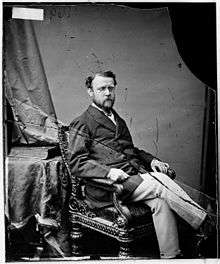Adam Badeau
| Adam Badeau | |
|---|---|
 | |
| Born |
December 29, 1831 New York City, New York |
| Died |
March 19, 1895 (aged 63) Ridgewood, New Jersey |
| Buried at | Sleepy Hollow Cemetery's Old Dutch Churchyard, Section D, Lot 65 |
| Allegiance | United States of America |
| Service/branch |
Union Army United States Army |
| Years of service | 1862–1869 |
| Rank |
|
| Unit |
Staff of Thomas W. Sherman Staff of Ulysses S. Grant |
| Battles/wars | |
| Spouse(s) | Marie E. Niles (m. 1875) |
| Other work |
Writer Diplomat |
Adam Badeau (December 29, 1831 – March 19, 1895) was an American author, Union Army officer, and diplomat. He was most prominent for his service on the staff of Ulysses S. Grant during the American Civil War.
Early life

Adam Badeau was born in New York City on December 29, 1831.[1] He was raised and educated in Tarrytown and North Tarrytown (now Sleepy Hollow), and became a clerk in New York City's Street Department.[2] He also studied law, and attained admission to the bar in 1855.[3] In addition, Badeau was a writer, and his work as an essayist and theater critic was published in Noah's Sunday Times.[4]
Civil War
In 1862, Badeau joined the Union Army for the American Civil War and was commissioned as a Captain. As a member of the staff of Thomas W. Sherman, he took part in the Siege of Corinth, Mississippi, the defense of New Orleans and the attack on Port Hudson, Louisiana.[5] He was wounded at Port Hudson,[6] and after his recovery, in 1864 he joined the staff of Ulysses S. Grant as a brevet Lieutenant Colonel. Badeau took part in the Wilderness and Appomattox campaigns and received promotion to brevet Colonel.[7]
Badeau remained on Grant's staff until 1869, and left the Army with the full rank of Captain and the brevet rank of Brigadier General.[8]
Post-Civil War
Badeau served as Secretary of the United States embassy in London, England from 1869 to 1870, and U.S. Consul in London from 1870 to 1881. He was granted a leave of absence from 1877 to 1878, when he accompanied Grant on Grant's trip around the world.[9]
In 1875 Badeau was nominated as Minister to Belgium,[10] and in 1881 he received appointment as Minister to Denmark,[11] but he declined both. From 1882 to 1884 he was U.S. Consul in Havana, Cuba.[12] Badeau resigned this appointment after alleging that officials in the State Department were corrupt in their dealings with Cuba and Spain, and stating that the department took no action after he made his charges.[13][14]
Badeau then aided Grant in the preparation of Grant's memoirs, but left Grant before the book was finished over a dispute about how much Badeau would be paid and how he would be credited for his editing, research and fact checking. (He subsequently settled with Grant's heirs for $10,000, or about $250,000 in 2012 dollars.)[15]
Career as author
Badeau was acquainted with many of the famous people and celebrities of his day, including Grant and Edwin Booth.[16] He was a prolific author of both fiction and non-fiction, and besides newspaper columns and magazine articles, his works included: The Vagabond (1859);[17] Military History of Ulysses S. Grant (1881);[18] Aristocracy in England (1885);[19] Conspiracy: A Cuban Romance (1885);[20] and Grant in Peace: From Appomattox to Mount McGregor (1887).[21]
Death and burial
Badeau died in Ridgewood, New Jersey on March 19, 1895[22] and was buried in Sleepy Hollow Cemetery's Old Dutch Churchyard, Section D, Lot 65.[23]
Family
Badeau was married on April 29, 1875 to Marie E. Niles,[24][25] the sister of Nathaniel Niles, who served as Speaker of the New Jersey General Assembly in 1872.[26]
References
- ↑ The Publishers Weekly, Obituary Notices: Adam Badeau, Volume 47, 1895, page 492
- ↑ William Richard Cutter, editor, American Biography: A New Cyclopedia, Volume 2, 1918, page 45
- ↑ Walter Hines Page, Joseph Mayer Rice, The Forum, Volume 16, 1893, page 397
- ↑ Charles Elliott Fitch, editor, Encyclopedia of Biography of New York, Volume 2, 1916, page 64
- ↑ Theodore L. Flood, Frank Chapin Bray, editors, The Chautauquan, Volume 21, 1895, page 235
- ↑ William S. McFeely, Grant: A Biography, 2002, page 497
- ↑ Mark Perry, Grant and Twain: The Story of a Friendship That Changed America, 2004, page 72
- ↑ William Richard Cutter, editor, American Biography: A New Cyclopedia, Volume 2, 1918, page 46
- ↑ Mark Twain, Autobiography of Mark Twain: The Complete and Authoritative Edition, Volume 1, 2010, page 477
- ↑ United States Senate, Journal of the Senate, 1875, page 69
- ↑ The School Herald, The Senatorial Resignations, Volume 1, page 66, June 1, 1881
- ↑ Hope Valley Advertiser, Grant and Badeau, April 3, 1895
- ↑ New York Times, Gen. Badeau's Resignation, April 15, 1884
- ↑ Baltimore Sun, Latest Foreign News, April 17, 1884
- ↑ New York Times, Gen. Badeau's Suit Ended, October 31, 1888
- ↑ Charles Harlen Shattuck, The Hamlet of Edwin Booth, 1969, page 18
- ↑ Adam Badeau, The Vagabond, 1859, title page
- ↑ Adam Badeau, Military History of Ulysses S. Grant, title page, 1881
- ↑ Adam Badeau, Aristocracy in England, 1881, title page
- ↑ Adam Badeau, Conspiracy: A Cuban Romance, 1885, title page
- ↑ Adam Badeau, Grant in Peace: From Appomattox to Mount McGregor, 1887, title page
- ↑ New York Times, Gen. Adam Badeau Dead, March 21, 1895
- ↑ Roger D. Hunt, Jack Brown, Brevet Brigadier Generals in Blue, 1990, page 23
- ↑ New York Times, Another Wedding, April 30, 1875
- ↑ New York Times, Obituary, Marie Badeau, May 19, 1915
- ↑ Mary Elizabeth Wilson Sherwood, Here & There & Everywhere: Reminiscences, 1898, page 124